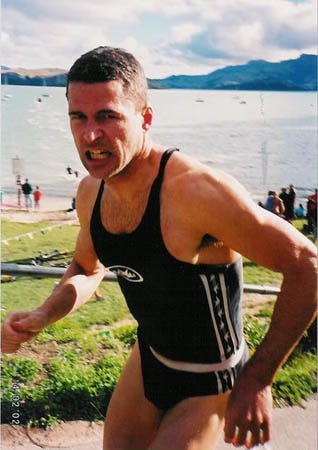We didn’t touch on anger in Chapter Eleven, Training The Mind. That was intentional (on Gordo’s part). I’m a long-distance specialist and I’ve found anger to be impossible to sustain across the duration of my events.
That said… we can’t ignore the utility of anger in certain athletic situations. When I ran training camps for Top Amateurs & Elites we had a saying…
When all else fails, try anger.
Gordo’s Experience
Napa Half Ironman, many years ago. It was a low key, mostly local race. I have a good swim and find myself at the front of the race. A strong bike follows and I lead off the bike.
However... as I head out on the run, Monica tells me I'm in 2nd and waaaay down... someone has cut the bike course I'm extremely pissed off and absolutely smash myself. No regard for pacing. All pain and anger. It takes me a long time to catch the guy (the run is nearly done when I bridge). I'm so upset when I get there that I run right past and on to the finish.
1:15 - my fastest half marathon, including stand alone events.
Generally, I race from a feeling of calm openness. Not that day
John’s Experience
I must confess, I sometimes raced angry—no, furious. Furious with my opponents, the waves, the hills, the potholes, the weather (fury, I’ve discovered, works wonders in a gusty headwind), and, of course, the well-meaning but woefully misguided souls on the sidelines yelling, “Looking good!” as if I couldn’t tell that was a bald-faced lie. But mostly, I was angry with myself.
“What on earth am I doing out here?” I’d think, “Surely there’s something more sensible I can do with my life?” Yet, oddly enough, the anger kept me going, locked firmly in the red zone—the absolute edge of the pace I could hope to sustain until the finish. When the inevitable suffering set in, I would daydream about the sweet relief of being hit by a runaway bus or truck to end it all.
These thoughts oddly spurred me on. The frustration of battling for every inch of water, road, and pavement. The fury of wringing every last drop of energy out of a body that clearly wanted to be anywhere but here. I wouldn’t mellow until I crossed the finish line, exhausted but knowing I’d given it my all. And then, just like that, I’d switch. My inner fury vanished, replaced by the humble, slightly sheepish triathlete accepting congratulations, accolades or commiserations, depending on the day.
Moments earlier, my inner mantra was “To hell with them all!” but after the race, I’d sign autographs for the kids and smile politely for the press. The same press who had absolutely no idea of the running tirade in my head throughout the race. Instead, I’d lie through my teeth, “Oh, I just paced myself and stuck to the plan: feel calm (yeah right!), stay close on the bike, make my move on the run, blah, blah, blah.” Then I’d add, “Full credit to the other lads; they made it tough,” all the while remembering how I’d been cursing them just hours earlier, fervently wishing one of them would be hit by the imaginary truck or bus instead of me.
Of course, I didn’t always race that way. It rather depended on the mood. When everything had gone smoothly in the lead-up to the race, when I was confident of a good result, I was calmer and more in control. No need to get annoyed at the conditions, the competition, or even the well-intentioned spectators offering their dubious encouragement. In those moments, my thoughts stayed focused—on rhythm, breathing, and the state of my legs. “Can I push a little harder?” I’d ask myself. “Or is it time to ease off a bit?” and, ‘Going well, John!’ A rather more civilised internal conversation, I’d say, compared to wanting to throttle anyone who dared to block my path. More “in the zone,” as they call it, whatever that means.
Now I wonder, which approach was better? These days, coaches will insist that calm focus and control are far superior to racing in a fit of rage. But I’m not entirely convinced. The truth is, you have to race according to how you feel. If you’re angry, why not use it? Channel it into raw energy to keep you going. If you’re calm and in control, use that too—it’s a luxury, and one worth hanging onto, especially if things are going your way. And if they’re not? Well, there’s always anger. You never know what might happen.
Back to Table of Contents







Love this take on anger and reflects something I’ve always said about the haka. The haka teaches a special kind of control over anger - how to bring out rage instantly and then keep it steady. We’re taught to channel that fury while staying on beat and clear-headed which requires intense control and a deep mind-body connection. It’s all about using that fire as fuel without letting it take over. When you’ve got that control, you’re unstoppable. Without it, you’re likely to slip up in the heat of the moment
Great article...anger releases plenty of catabolic chemicals into the body...interested to know how recovery might differ between racing angry and racing in control. Anecdotally...I'm pretty sure the few time I've raced angry, I've been completely wrung out (mentally) following it.